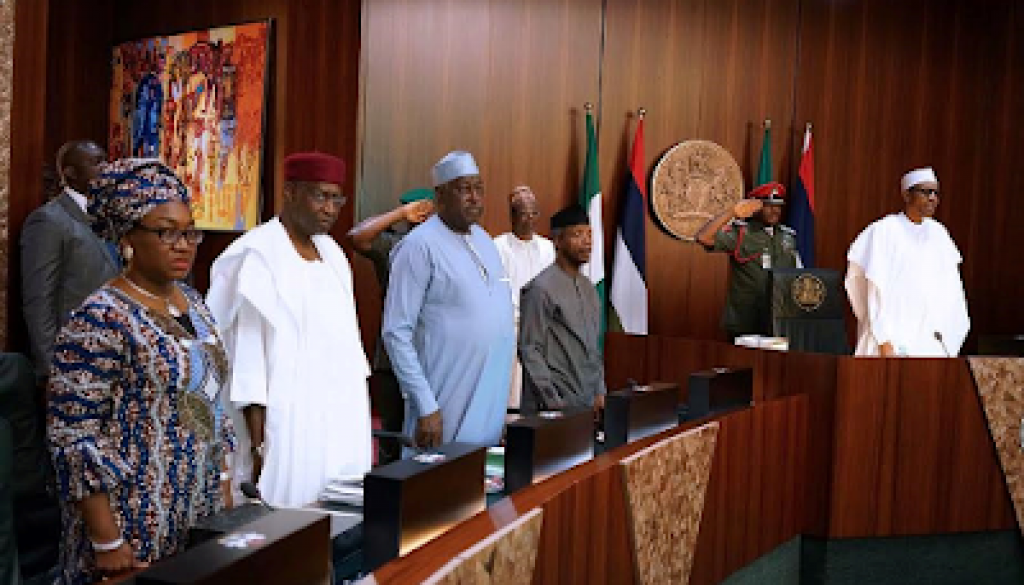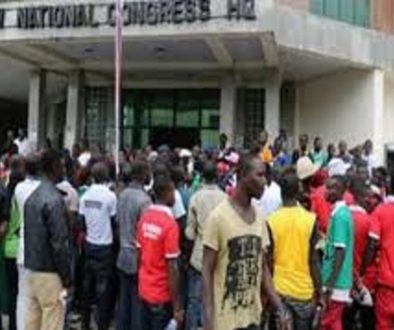Nigeria: Cabinet Approves Proposed Agreement On African Free Trade
Nigeria is set to sign the framework agreement for the
establishment of African Continental Free Trade Area (AfCFTA).
establishment of African Continental Free Trade Area (AfCFTA).
The agreement establishing the AfCFTA would flag off the
“Single Liberalised Market for Trade in Goods and Services” in
Africa.
“Single Liberalised Market for Trade in Goods and Services” in
Africa.
 |
| Federal Executive Council Meeting (Photo: Dailypostng) |
The AfCFTA is a negotiated rules-based system, to establish the
rule of law in trade, deepen and expand intra-Africa trade from its very low
base of 14 per cent.
rule of law in trade, deepen and expand intra-Africa trade from its very low
base of 14 per cent.
The Federal Executive Council (FEC) in its meeting on Wednesday
gave the Minister of Trade & Investment, Okechukwu Enelamah, the authority
to go-ahead to seal the agreement on behalf of Nigeria.
gave the Minister of Trade & Investment, Okechukwu Enelamah, the authority
to go-ahead to seal the agreement on behalf of Nigeria.
The agreement is expected to be concluded during the forthcoming
Extraordinary Meeting of the African Union (AU) Heads of State and Government
scheduled for Kigali, Rwanda, on March 21, 2018.
Extraordinary Meeting of the African Union (AU) Heads of State and Government
scheduled for Kigali, Rwanda, on March 21, 2018.
At the end of the meeting in Abuja, Mr. Enelamah told State
House Correspondents that the country stood to gain a lot from the AfCFTA,
particularly in terms of export of goods and services from the Nigerian market.
House Correspondents that the country stood to gain a lot from the AfCFTA,
particularly in terms of export of goods and services from the Nigerian market.
“This is an important agreement. It’s part of our ambitious
economic agenda to generate more exports for Nigeria. African market is about
1.2 billion people, while we (Nigeria) are 180 million. We are going into this
clearly wanting to improve market access for our products and our people,”
Mr. Enelamah said.
economic agenda to generate more exports for Nigeria. African market is about
1.2 billion people, while we (Nigeria) are 180 million. We are going into this
clearly wanting to improve market access for our products and our people,”
Mr. Enelamah said.
Besides, he said Nigeria needed the agreement to help protect
her markets from unfair trade practices like dumping, “smuggling and all
the other negative things that impact the economy”.
her markets from unfair trade practices like dumping, “smuggling and all
the other negative things that impact the economy”.
He said President Muhammadu Buhari had in February 2017 given a
set of objectives to be built into negotiations for the detailed draft paper
and terms of the framework as well as the final implementation strategy.
set of objectives to be built into negotiations for the detailed draft paper
and terms of the framework as well as the final implementation strategy.
Besides, the Minister said the president also constituted a
negotiating committee, made up of members of the organised private sector and
businesses, including the Manufacturers Association of Nigeria and the Nigerian
Association of Chambers of Commerce, Industry, Mines and Agriculture.
negotiating committee, made up of members of the organised private sector and
businesses, including the Manufacturers Association of Nigeria and the Nigerian
Association of Chambers of Commerce, Industry, Mines and Agriculture.
The AfCFTA was established in 2012 by all Heads of State and
Government of the AU at their 18th Ordinary Session to implement the AU Agenda
2063 “Vision” for an integrated, prosperous and peaceful Africa.
Government of the AU at their 18th Ordinary Session to implement the AU Agenda
2063 “Vision” for an integrated, prosperous and peaceful Africa.
Actual negotiations for the AfCFTA commenced in 2015, with Stage
1 covering trade in goods and services, and Stage 2, covering intellectual
property, competition policy and investment.
1 covering trade in goods and services, and Stage 2, covering intellectual
property, competition policy and investment.
Negotiations on Stage 1 are expected to be concluded in this
month in Kigali, Rwanda, where Heads of State and government would “adopt,
sign and launch the African Continental Free Trade Area”.
month in Kigali, Rwanda, where Heads of State and government would “adopt,
sign and launch the African Continental Free Trade Area”.
For Nigeria, Mr. Enelamah said the country would gain
significantly through the expansion of market access for exporters of goods and
services, spur growth and boost job creation.
significantly through the expansion of market access for exporters of goods and
services, spur growth and boost job creation.
Besides, he said established rules-based trade governance in
intra-African trade would invoke trade remedies as safeguards, anti-dumping and
countervailing duties against unfair trade practices, including dumping,
trans-shipment of concealed origin of products.
intra-African trade would invoke trade remedies as safeguards, anti-dumping and
countervailing duties against unfair trade practices, including dumping,
trans-shipment of concealed origin of products.



